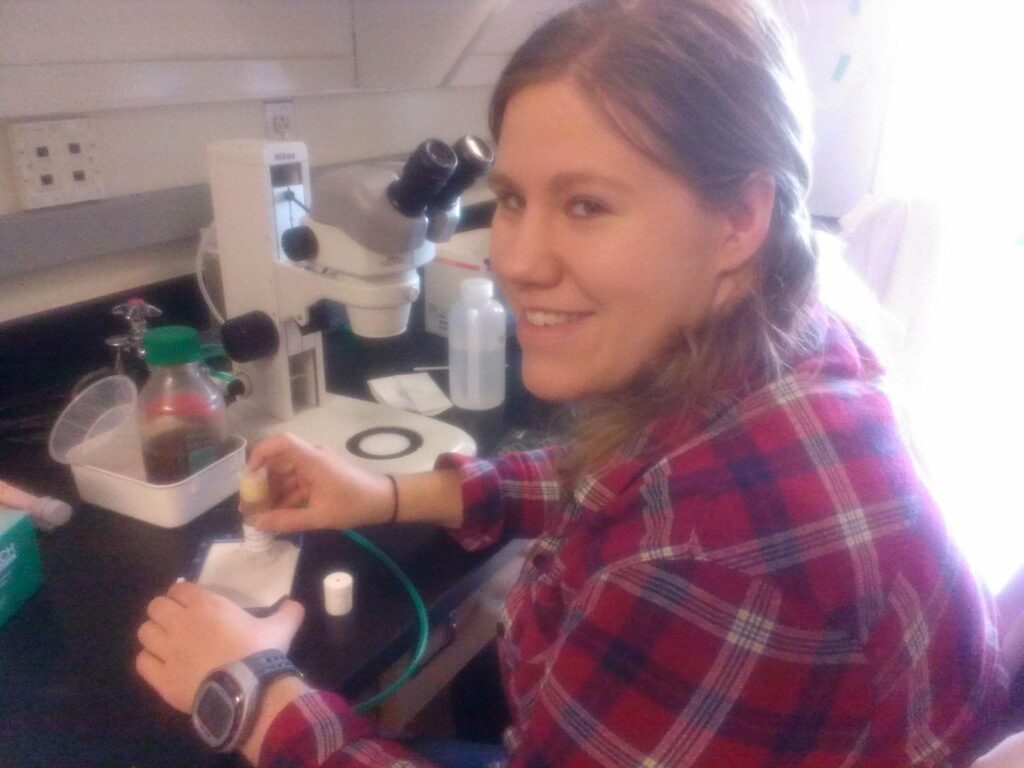Meet Dr. Noel!
Dr. Sophie Noel joined the BIT Program in January as our newest Teaching Postdoctoral Scholar. A former doctoral student at NC State, she was especially interested in joining the Program after her former positive experiences completing the BIT minor. “[When coming to NC State for graduate school], I saw a lot of value in having this resource that could help me learn different research skills,” she said.
Before coming to North Carolina, she attended Michigan State University, where she majored in chemical engineering and was offered an undergraduate research position in an engineering lab. After working in that lab for two years, she was able to do an REU at the University of Massachusetts-Amherst between her sophomore and junior years. Once she graduated, she decided to pursue a doctoral degree in engineering because she wasn’t interested in the jobs she could get with a bachelor’s. “Both of my parents are English professors, and I thought that sounded fun,” so she planned to pursue a career as a professor.

But towards the end of her graduate degree at NC State, she started to have doubts about becoming a professor. “I was kind of disillusioned with the idea of finding a faculty position,” she said. “I was tired of academia, and I didn’t want to have to move somewhere else.” So she took an internship, which then became a full time job, at a company called Baebies. The company specializes in designing assays and screening tools for infants. She had never considered a career in industry before, but she found that she liked the fast-paced environment. “I found it incredibly fulfilling,” she said, and she worked in their technology development team for several years.
After working at Baebies, she started working as an adjunct instructor at Durham Technical Community College, where she taught a small laboratory course called BioPharma Lab Skills. “That semester was an adventure,” she said. Many of the reagents were expired or arrived too late, and the labs she had planned rarely worked out the way she wanted them to. But she enjoyed the challenge of overcoming these obstacles, and the students were able to get a first-hand look at how science happens in a lab environment, as they all worked on troubleshooting the problems that popped up. After that semester, she moved to Wake Technical Community College, where she taught Introduction to Engineering for four semesters. But after a while, she wanted a change. “I wanted a job that was more mentally stimulating than teaching the same course over and over again.”
Because of her experience with the BIT Program during her PhD, it made sense for her to apply to the postdoctoral teaching program. “I knew [Dr. Dums] while I was in school, and I TA’d for Dr. Srougi, and I knew Dr. Goller through a few professional development opportunities,” she said. “So this is a job transition, yes, but this is also a group of people I already know and trust.”
This semester, Dr. Noel is teaching a section of the core course (BIT 410/510) and co-teaching Bioethics (BIT 501) with Dr. Hasley. Though the core course has been updated since she took it, she’s still really enjoyed getting back into the program. “I feel so supported here,” she said, “There’s a group of people around me who are actively working to make their courses better.” And co-teaching with Dr. Hasley has been “so wonderful.” Because they come from different backgrounds, they’re able to bring different perspectives to the table and improve the course in their own ways.
Another aspect of the postdoc training that she is looking forward to is the opportunity to work more closely with undergraduate students. The BIT Program places a lot of emphasis on mentorship, which is something she has missed since finishing her degree. “I forgot how much I loved working with undergraduate researchers,” she said. And she’s looking forward to sharing her own expertise with students when she designs her own course.
While she worked at Baebies, she got very interested in assay design, so she hopes to design a course that incorporates that experience. When she was in graduate school, she got a lot of help with troubleshooting protocols from a scientist from Immunoreagents, who used to have a lab across the hall from hers. “That was just so valuable, and I want to pass that down to students and teach them how to troubleshoot their own assays,” she said. Most labs aren’t designing their own assays, but being able to work through any problems they may have is an important skill for anyone in a lab to have.
Dr. Noel wants her current and future students to know that they can always ask her questions.
Dr. Noel wants her current and future students to know that they can always ask her questions. “I don’t expect that I will always explain everything perfectly,” she said, “and I want to make sure I’m clearing up anything they are confused or curious about.” People learn and develop at their own paces, and she wants students to feel comfortable with figuring things out as they go. She hopes to prioritize students’ understanding in this and any future teaching positions she has.
- Categories: